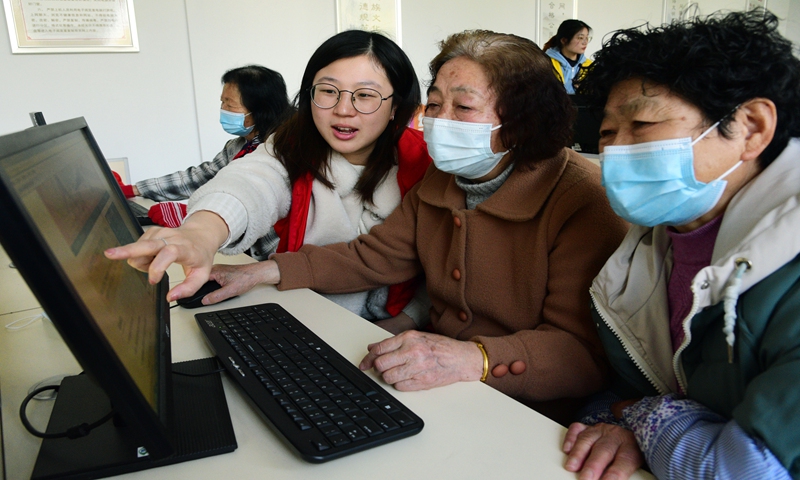
Volunteers from Jiangsu University help the elderly browse news about the two sessions online in Zhenjiang, East China's Jiangsu Province on March 8, 2022. Older people are using computers and smartphones to read about old-age security, medical care policies, and services for the elderly discussed at the two sessions. Photo: VCG
China will improve the elderly-care work mechanism, and specific work on coordinating and promoting work for seniors organized by the National Health Commission (NHC) and the national working committee on ageing will be managed by the Ministry of Civil Affairs, according to a plan on reforming State Council institutions submitted on Tuesday to the national legislature for deliberation. Experts said the move will be beneficial for maximizing the coordination of various policies on coping with China's aging population.
The country will implement the proactive national strategy in response to population aging and expand the basic elderly-care services to cover all senior citizens, said the plan. The civil affairs ministry will have responsibilities such as coordinating and promoting ageing-related work conducted by the NHC and undertaking the specific work of the national working committee on ageing.
The office of the national working committee on ageing will be relocated in the ministry to strengthen its responsibilities for coordinating, supervising, guiding, and organizing the elderly-care work. The China National Committee on Ageing will also be managed by the ministry, according to the plan.
The government aims to redefine and give full play to the corresponding responsibilities of relevant departments in dealing with aging in this institutional reform, so as to maximize the coordination and implementation of various policies on coping with aging, Lu Jiehua, a professor of sociology at Peking University, told the Global Times on Tuesday.
Delayed retirement and re-employment of the elderly, as an important part of "releasing the potential of the elderly labor force," can help to adapt to the changes in the age composition of the Chinese population. China has seen a shrinking of the workforce and an increasing number of elderly people due to greater life expectancy, Lu explained.
The social participation of the elderly is actually an appropriate extension of the period of demographic dividend, which is more beneficial than harmful for the development of Chinese society. The next series of population policies will be implemented gradually according to different age groups of senior citizens in different parts of the country, Lu said.
By the end of 2022, China's population aged 60 or above reached 280 million, accounting for 19.8 percent of the total population. Among the 280 million, the population aged 65 or above reached 200 million, accounting for 14.9 percent of the total population, according to data released by the National Bureau of Statistics on February 28.
In order to improve elderly-care services and ease the problems and pressure caused by the increasing elderly population, the country has been making efforts to improve the living quality of seniors.
Chinese authorities issued an action plan to improve the standardization of elderly care and domestic services in early February.
Chinese seniors now have the opportunity to study in a national-level university. The Seniors University of China (SUC) for the aged was established on March 3, offering classes such as skills training, cultural inheritance education and scientific research. It also provides teaching activities both online and offline for seniors nationwide.




